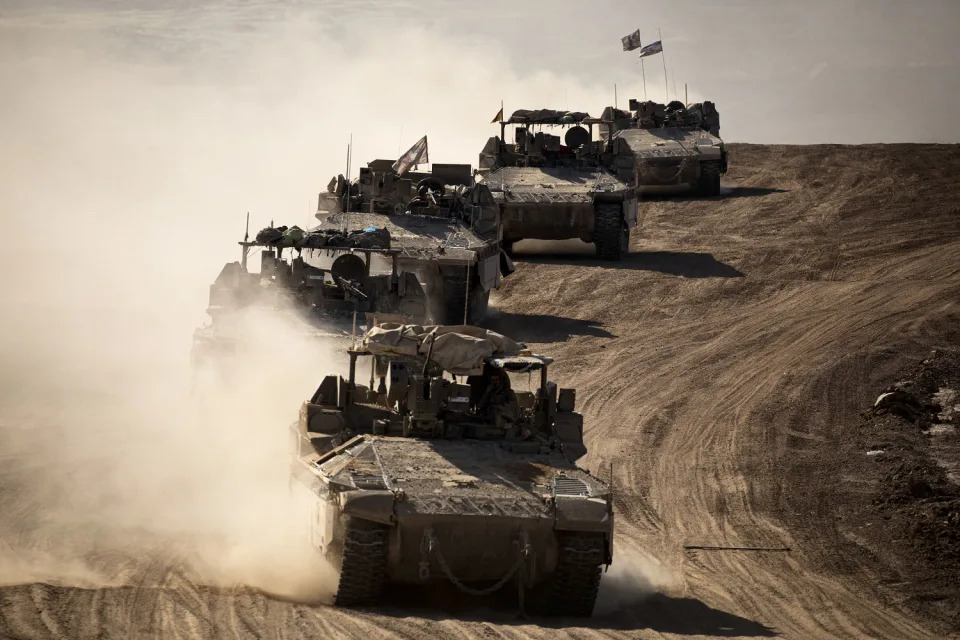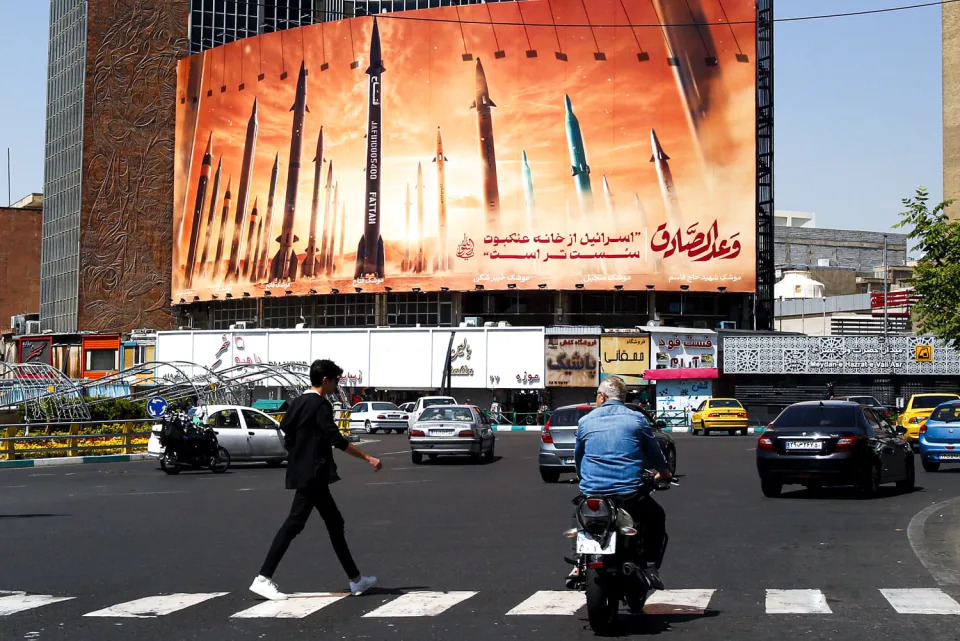-
Israel used a "Rampage" missile in its strike on Iran, Israeli media reported.
-
The supersonic missile is designed to strike ground targets such as military bases.
-
Its manufacturer describes it as "a long-range, air-to-ground" missile.
Israel used a long-range, supersonic missile in its strike on Iran earlier this week, Israeli broadcaster Kan reported, per The Times of Israel.
US officials said Israel carried out a missile strike on a military base near the city of Isfahan, Iran, on Friday. Israel has not confirmed the reports, while Iran has sought to downplay the incident, only referencing small drones used in the attack, which its foreign minister said were "like toys our children play with."
While it remains unclear what weapons were used in the strike, Kan reported that Israel used a "Rampage" air-to-surface missile, claiming it was identified in photos and that damage caused by the attack was consistent with a Rampage strike, per The Times of Israel.
The Rampage missile was designed by Israel Aerospace Industries (IAI) for use against targets such as "communication and command centers, air forces bases, maintenance centers and infrastructure," according to the company's website.
The company describes the missile, which weighs 1,250 pounds, as "a long-range, air-to-ground, seekerless, precision strike weapon."
It has the ability to fly at 1,250 mph with a range of up to 190 miles.
It can be fired from an aircraft or as a stand-alone system and uses GPS/INS guidance navigation and anti-jamming capabilities, it adds.
It has a blast fragmentation or general-purpose warhead.
A video shared on the company's YouTube channel simulates a strike by the missile.
Two Western officials said that the Israeli strike on Iran, which was launched in response to Iran's attack on Israel last week, was intended to show Tehran that it could evade its air defense systems undetected, The New York Times reported.
Business Insider contacted the IDF and the IAI for comment.
It was reported last year that the UK's Royal Air Force was considering buying the advanced Israeli weapon to replenish its missile stocks after having donated many of its own Storm Shadow cruise missiles to Ukraine.
The Rampage is considered an economical alternative costing hundreds of thousand of dollars versus the $3 million cost of each Storm Shadow, reported The National.
Iran and Israel's recent attacks, explained
Tensions between Israel and Iran have reached an unprecedented high in recent days. Last Saturday, Iran launched a barrage of missiles and drones on Israel in response to an Israeli airstrike earlier this month that killed several Iranian military officers.
Israel responded Friday with a targeted operation in Iran that was limited in scope, a source familiar with the matter said.
As a conflict that could further destabilize the Middle East unfolds, here's what to know.
What did Israel's recent attack on Iran look like?
Iran is currently assessing the damage from Friday's attack, a source familiar with the situation told NBC News, but a nuclear facility in the central Iranian city of Isfahan is safe.

The United States has claimed it was not involved with the Israeli attack on Iran, and U.S. officials publicly encouraged restraint in the days leading up to it.
On Friday at a news conference during a G7 meeting in Italy, Secretary of State Antony Blinken said the U.S. was “intensely focused” on de-escalating the situation.
Why did Iran attack Israel on April 13?
Iran's attack on Israel was in response to a deadly Israeli airstrike on April 1 at the Iranian consulate in Damascus, Syria. Brig. Gen. Mohammad Reza Zahedi, a senior commander in the Islamic Revolutionary Guard's Quds Force, was among several officers killed in the strike.
Iran's retaliatory attack on Israel left minimal destruction because the vast majority of the more than 300 drones and missiles it fired were shot down by Israeli, U.S. and European forces before reaching Israeli territory.
Israel vowed to retaliate for the Iranian strikes, the first-ever direct military attack by Tehran on the Jewish state.
What are Iran and Israel's nuclear capabilities?
Iran's nuclear capabilities are still unknown. The 2015 Iran nuclear deal brokered by the Obama administration and several other nations limited the country's nuclear capabilities, but the Trump administration withdrew from the accord.

Israel has not confirmed whether it has nuclear weapons, but it's widely believed the country has the technology to produce such equipment.
Who are the leaders of the two countries?
Ayatollah Ali Khamenei has been the supreme leader of Iran since 1989. Ali Khamenei was also the country's third president from 1981 to 1989. Ebrahim Raisi is Iran's current president. In Iran, the supreme leader, not the president, is the head of state.
Prime Minister Benjamin Netanyahu has served three separate tenures as prime minister since 1996. He has drawn fierce criticism in recent months for his failure to stop the Oct. 7 Hamas terrorist attack on Israel, which killed some 1,200 people. He has also been criticized for his handling of the war against Hamas in Gaza, which has killed more than 33,000 people, according to Palestinian health officials.
Who are their allies?
Iran’s allies include proxy groups in the region such as Hezbollah, Hamas and the Houthis. The country also has broader support from Syria and ties to other countries in the Middle East and beyond.Israel, also, has alliances with some countries in the Middle East, including Saudi Arabia, Jordan and the United Arab Emirates. Israel is a "major non-NATO ally," which means member countries are not committed to standing by it if it is attacked, though Israel does have military ties to countries within NATO, like the U.S., and beyond.
The U.S., Britain and Jordan claim to have helped defend Israel itself during the April 13 attacks.
Iran demonstrated power against Israel: Iran's Khamenei
In its first ever direct attack on Israel, Iran sent a barrage of more than 300 missiles and drones on April 13 in what it said was retaliation for Israel's suspected deadly strike on its embassy compound in Damascus on April 1.
Most of the missiles and drones were shot down by Israel and its allies and the attack caused modest damage in Israel.
"How many missiles were launched and how many of them hit their target is not the primary question, what really matters is that Iran demonstrated its power during that operation," Khamenei said on Sunday.
Early on Friday, explosions echoed over the Iranian city of Isfahan in what sources said was an Israeli attack. Tehran played down the incident and said it had no plans for retaliation - a response that appeared gauged towards averting region-wide war.
"In the recent operation, the armed forces managed to minimize costs and maximize gains," Khamenei added, urging military officials to "ceaselessly pursue military innovation and learn the enemy's tactics."


